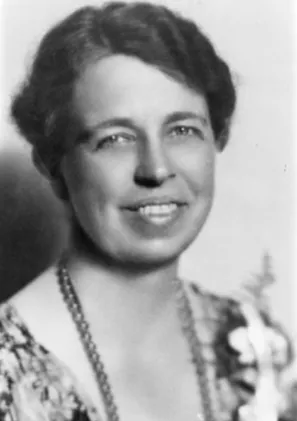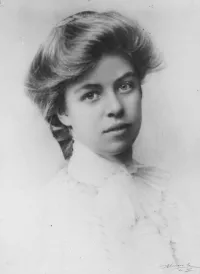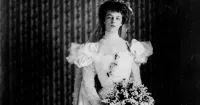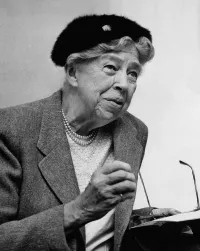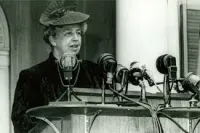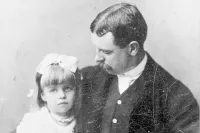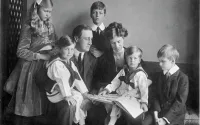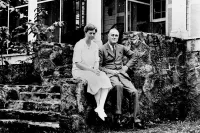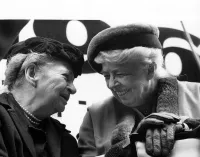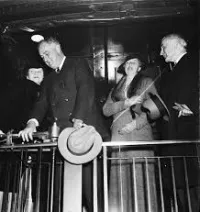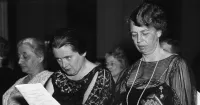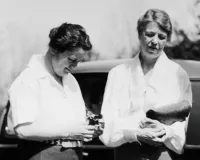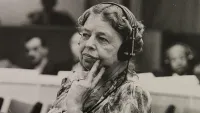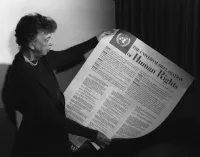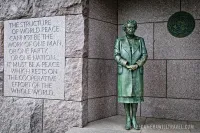Biography
1884 - 1962
“Freedom makes a huge requirement of every human being. With freedom comes responsibility. For the person who is unwilling to grow up, the person who does not want to carry his own weight, this is a frightening prospect.”
– Eleanor Roosevelt
In the years following World War I Eleanor Roosevelt became independently active in a variety of political and social causes including the League of Women Voters, the Women’s Trade Union League and the women’s caucus of the Democratic Party. She also assumed an increasingly public role as spokesperson for a number of groups, most notably African-Americans, youth, the poor and others in need of a humane political voice. As First Lady for an unprecedented 12 years, Roosevelt’s behind-the-scenes influence was great. Her widely distributed syndicated newspaper column, radio show, formal press conferences, and extensive travelling furthered the liberal humanitarian causes she championed. Roosevelt developed a close inner-circle of women friends, several of whom were lesbians, including her most intense emotional relationship with prominent newspaper correspondent Lorena Hickok, who lived at the White House from 1940 to 1944. Following FDR’s death Mrs. Roosevelt was appointed to the U.S. delegation to the United Nations where she became chair of the committee that produced the Universal Declaration of Human Rights in 1948. She remained an influential member of the Democratic Party until her death in 1962. Though Hickok attempted to re-write much of their correspondence in an effort to conceal their involvement from Roosevelt’s legacy, the surviving 2,300 letters the two women exchanged, which are preserved at the FDR Library, contain overwhelming evidence of the nature of the 30-year relationship. Though criticized through much of her life for her liberal views, Eleanor Roosevelt was universally admired during her later years. Dubbed “First Lady of the World” by President Harry Truman, she remains one of the most influential figures of the 20th-century.
1884 - 1962
“Freedom makes a huge requirement of every human being. With freedom comes responsibility. For the person who is unwilling to grow up, the person who does not want to carry his own weight, this is a frightening prospect.”
– Eleanor Roosevelt
In the years following World War I Eleanor Roosevelt became independently active in a variety of political and social causes including the League of Women Voters, the Women’s Trade Union League and the women’s caucus of the Democratic Party. She also assumed an increasingly public role as spokesperson for a number of groups, most notably African-Americans, youth, the poor and others in need of a humane political voice. As First Lady for an unprecedented 12 years, Roosevelt’s behind-the-scenes influence was great. Her widely distributed syndicated newspaper column, radio show, formal press conferences, and extensive travelling furthered the liberal humanitarian causes she championed. Roosevelt developed a close inner-circle of women friends, several of whom were lesbians, including her most intense emotional relationship with prominent newspaper correspondent Lorena Hickok, who lived at the White House from 1940 to 1944. Following FDR’s death Mrs. Roosevelt was appointed to the U.S. delegation to the United Nations where she became chair of the committee that produced the Universal Declaration of Human Rights in 1948. She remained an influential member of the Democratic Party until her death in 1962. Though Hickok attempted to re-write much of their correspondence in an effort to conceal their involvement from Roosevelt’s legacy, the surviving 2,300 letters the two women exchanged, which are preserved at the FDR Library, contain overwhelming evidence of the nature of the 30-year relationship. Though criticized through much of her life for her liberal views, Eleanor Roosevelt was universally admired during her later years. Dubbed “First Lady of the World” by President Harry Truman, she remains one of the most influential figures of the 20th-century.
Demography
Demography
Gender Female
Sexual Orientation Bisexual
Gender Identity Cisgender
Ethnicity Caucasian/White
Faith Construct Protestant
Nations Affiliated United States United Kingdom
Era/Epoch Civil Rights Movement (1954-1968) First-wave Feminism (1848-1930) Great Depression (1929-1939) Progressive Era (1890-1920) Roaring Twenties (1920-1929) World War II (1939-1945)
Field(s) of Contribution
Author
Diplomacy
Journalism
Lecturer
Politics
Radio
Social Justice
Television
Commemorations & Honors
First United States Representative to the United Nations Commission on Human Rights
Received First Annual Franklin Delano Roosevelt Brotherhood Award (1948)
U.S. Postal Service Commemorative Stamp Issued in Her Honor (1963)
UN Bestowed Eleanor Roosevelt With Its Human Rights Prize (1968)
Posthumous National Women's Hall of Fame Inductee (1973)
Eleanor Roosevelt National Historic Site at Val-Kill Established by Congress (1977)
Eleanor Roosevelt Monument in New York's Riverside Park Dedicated (1996)
Franklin Delano Roosevelt Memorial in Washington D.C. Added Bronze Statue of Eleanor Standing Before the United Nations Emblem (1997)
Eleanor Roosevelt Award for Human Rights Established by Then President Bill Clinton (1998)
U.S. Five Dollar Bill to Feature Eleanor Roosevelt, Marian Anderson and Dr. Martin Luther King Jr., (2020)
Demography
Gender Female
Sexual Orientation Bisexual
Gender Identity Cisgender
Ethnicity Caucasian/White
Faith Construct Protestant
Nations Affiliated United States United Kingdom
Era/Epoch Civil Rights Movement (1954-1968) First-wave Feminism (1848-1930) Great Depression (1929-1939) Progressive Era (1890-1920) Roaring Twenties (1920-1929) World War II (1939-1945)
Field(s) of Contribution
Author
Diplomacy
Journalism
Lecturer
Politics
Radio
Social Justice
Television
Commemorations & Honors
First United States Representative to the United Nations Commission on Human Rights
Received First Annual Franklin Delano Roosevelt Brotherhood Award (1948)
U.S. Postal Service Commemorative Stamp Issued in Her Honor (1963)
UN Bestowed Eleanor Roosevelt With Its Human Rights Prize (1968)
Posthumous National Women's Hall of Fame Inductee (1973)
Eleanor Roosevelt National Historic Site at Val-Kill Established by Congress (1977)
Eleanor Roosevelt Monument in New York's Riverside Park Dedicated (1996)
Franklin Delano Roosevelt Memorial in Washington D.C. Added Bronze Statue of Eleanor Standing Before the United Nations Emblem (1997)
Eleanor Roosevelt Award for Human Rights Established by Then President Bill Clinton (1998)
U.S. Five Dollar Bill to Feature Eleanor Roosevelt, Marian Anderson and Dr. Martin Luther King Jr., (2020)
Resources
Resources
Baker, Russell "The Charms of Eleanor". The New York Review of Books, June 9, 2011.
Bloom, Amy. White Houses. New York: Random House, 2019.
Cerrito, Joann. "Eleanor Roosevelt." Gay & Lesbian History. Michael J. Tyrkus, ed. Detroit: St. James, 1997. 379-82.
Cook, Blanche Wiesen. Eleanor Roosevelt, Volume I: 1884-1933; Eleanor Roosevelt, Volume 2, 1933-1938. New York: Viking, 1992.
Faderman, Lillian, Odd Girls and Twilight Lovers: A History of Lesbian Life in Twentieth-Century America, Penguin Books Ltd, 1991.
Rowley, Hazel. Franklin and Eleanor: An Extraordinary Marriage. Farrar, Straus and Giroux, 2010.
Streitmatter, Roger, ed. Empty Without You: The Intimate Letters of Eleanor Roosevelt and Lorena Hickok. New York: The Free Press, 1998.
http://en.wikipedia.org/wiki/Eleanor_Roosevelt
http://www.huffingtonpost.com/michelangelo-signorile/the-roosevelts-ken-burns_b_5866998.html
http://www.ptownfringe.org/lorena_extras.htm
http://www.brainpickings.org/2012/10/11/eleanor-roosevelt-lorena-hickok-love-letters/
Resources
Baker, Russell "The Charms of Eleanor". The New York Review of Books, June 9, 2011.
Bloom, Amy. White Houses. New York: Random House, 2019.
Cerrito, Joann. "Eleanor Roosevelt." Gay & Lesbian History. Michael J. Tyrkus, ed. Detroit: St. James, 1997. 379-82.
Cook, Blanche Wiesen. Eleanor Roosevelt, Volume I: 1884-1933; Eleanor Roosevelt, Volume 2, 1933-1938. New York: Viking, 1992.
Faderman, Lillian, Odd Girls and Twilight Lovers: A History of Lesbian Life in Twentieth-Century America, Penguin Books Ltd, 1991.
Rowley, Hazel. Franklin and Eleanor: An Extraordinary Marriage. Farrar, Straus and Giroux, 2010.
Streitmatter, Roger, ed. Empty Without You: The Intimate Letters of Eleanor Roosevelt and Lorena Hickok. New York: The Free Press, 1998.
http://en.wikipedia.org/wiki/Eleanor_Roosevelt
http://www.huffingtonpost.com/michelangelo-signorile/the-roosevelts-ken-burns_b_5866998.html
http://www.ptownfringe.org/lorena_extras.htm
http://www.brainpickings.org/2012/10/11/eleanor-roosevelt-lorena-hickok-love-letters/
